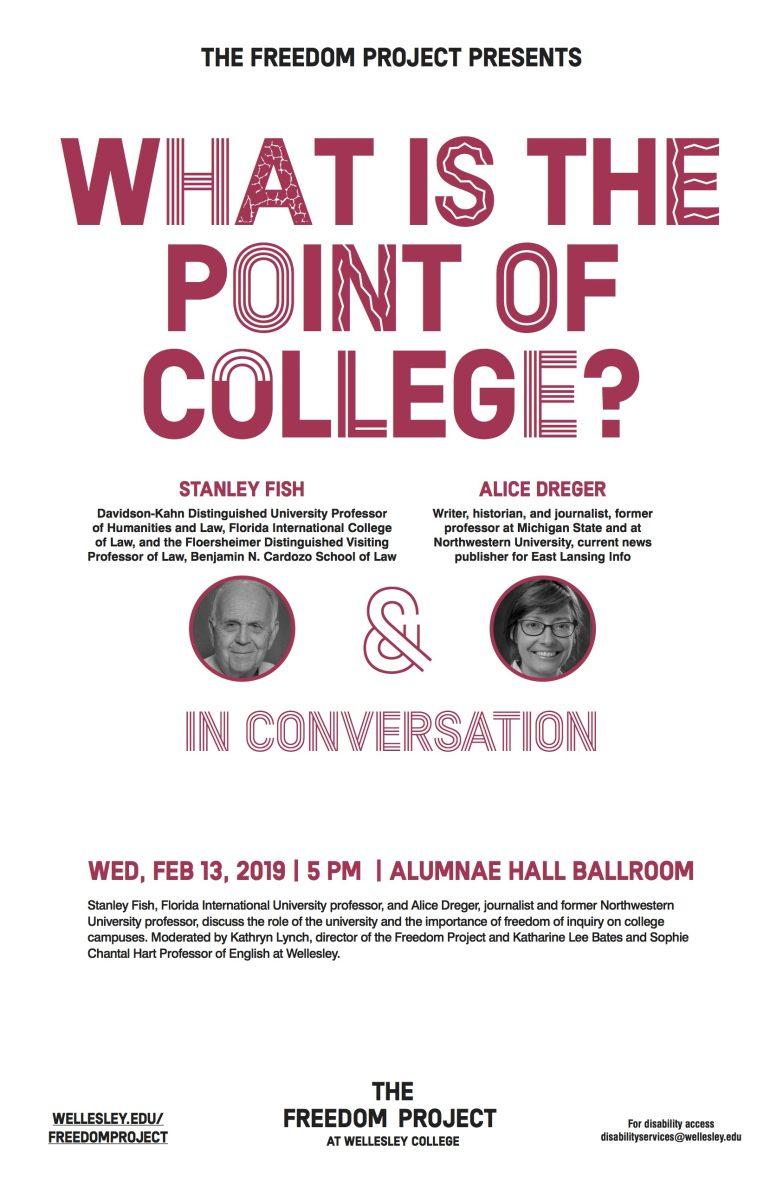Last spring, Alice Dreger’s lecture inspired what some considered to be the beginning of the end for the Freedom Project, a sometimes controversial group on campus dedicated to the expression of “freedom in all of its manifestations.” That is why many were shocked to hear that the Freedom Project had again invited Alice Dreger to speak on campus last Wednesday, Feb. 13, this time alongside Stanley Fish, a world-famous literary theorist and legal scholar. Dreger’s appearance at Wellesley follows last year’s disputed invitation, which divided the campus over issues of free speech versus comfort and safety. This time, the Freedom Project extended a second invitation to give Dreger “a fairer hearing, a better reception” according to the project’s director Kathy Lynch.
In February 2018, Alice Dreger, former professor of clinical medical humanities and bioethics at Northwestern University, was protested by students because of a troublesome section in her book, Galileo’s Middle Finger. Dreger addresses “autogynephilia,” a theory that some trans women transition because of an erotic love of the idea of being a woman. Students were concerned that addressing autogynephilia, a phenomenon that applies to very few people, may perpetuate incorrect and dangerous stereotypes about the sexual deviancy of trans women. As a result, protesters touted Dreger “transmisogynist” and “transphobic.” On the evening of her speech, a number of students respectfully stood outside of the lecture. In response, Dreger explained that her goals were simply to give a voice to the many different experiences of trans and intersex people, including autogynephilia. Dreger reacted calmly to the protesters, but later wrote on her blog that “it was impossible not to leave with a renewed sense of just how f[***]ed up campuses are right now.” After the protest and a number of Boston Globe articles, the Freedom Project took a hit: backers pulled support, fellows were maligned, and “scholars at risk” from Iran and Turkey, a project-funded program that supports intellectuals from countries with highly limited free speech, had to relocate to other universities. The program’s previous director, sociology Professor Thomas Cushman, took a visiting position at another university, and the program was taken over by English Professor Kathy Lynch.
Given the controversy surrounding Freedom Project at the end of last year, it is rather surprising that on Wednesday, exactly one year after her last visit, the Freedom Project would invite Dreger to Wellesley again. This year’s speech topic was “What is the Point of College?” to be debated with theorist Fish. When directly asked why have a second invitation, extended just several months after the first, visiting fellow of the Freedom Project and PhD candidate Shingirai Taodzera explained that the program aimed to provide students with the opportunity to “engage” with speakers, especially ones they deem “harmful.” He continued, “in life it is often impossible ‘talk-back’ to people with whom we disagree.” Director Lynch explained that she did not believe students had been given that opportunity in the previous lecture.
Probably the most unexpected of all, however, was that this year’s panel — smartly assigned, witty and provocative — actually became the Freedom Project’s redemption. Wellesley students Melanie Poggi ’21 and Ana Rijal ’21 even described the event as the best lecture they had attended this year.
This recent success can be much attributed to the new design structure: a pre-lecture conversation, a panel with interjections and questions from Director Lynch and a robust Q&A session. In previous years, the general student population did not have an opportunity for more intimate discussion with speakers; only open to Freedom Project fellows and interested faculty, these one-sided conversations resulted in inevitable accusations from both sides of a general lack of listening.
This year, however, productive debates were inspired. First, at the pre-lecture conversation, seven students — both past protesters and program fellows —asked pressing questions to Dreger and Lynch. Esther Jaffee, a senior at Wellesley, even suggested ways in which the Freedom Project can further improve.
The next success was placing Dreger alongside Fish, whose incredible wit and poise carried his argument with confidence — that “free speech” actually has nothing to do with college, since he believes college should be a place for only impassioned academic inquiry and nothing else. Dreger, awed to be seated alongside Fish, agreed with him in most respects, but did claim respectful, academic social activism had a place in college. The lecture continued with laughter and insight, including anecdotes and sincere life advice. The lecture was not without contention, however, as Fish finished calling college administrators “hopeless,” and Dreger explained how much control the National Collegiate Athletic Association (NCAA) and other business systems have over universities, calling university brand deals “Satan.”
While Dreger’s second appearance at Wellesley was expected to spark another protest, it instead inspired an amazing display of productive, thought-provoking conversation. The success of the Dreger/Fish lecture can be attributed to healthy dialogue between the Freedom Project administrators and the student body, a respectful exchange of ideas and the confidence of students to stand up for their thoughts and opinions. We have only the highest hopes going forward that the values of both Wellesley College and the Freedom Project alike can continue to find the same balance expressed in Wednesday night’s lecture.




